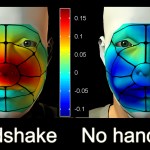students
Today's guest blogger is Idan Frumin, a student in the group of Prof. Noam Sobel in the Neurobiology Department. Their research on the transmission of odor compounds while shaking hands appears today in eLife.
It all started one day after lunch, sometime back in 2011. We sat in the lab’s living room (Yeah, we have a living room. And a bedroom. And a blind pet cat. But that’s a different story), when Noam asked – ever wonder why people shake hands?
– To show you don’t have a saber up your sleeve – I immediately retorted.
– But that seems odd, doesn’t it? After all, we’re not in the…
Prof. Nir Orion
Science Teaching researcher Prof. Nir Orion recently returned from Peru, where his award-winning Blue Planet teaching unit was adopted by the Peruvian Ministry of Education
Q: You have been working for many years to get schoolchildren out of the classroom setting. Why?
A: Schools in general and science teaching in particular are supposed to teach children about the world they live in. But they do it in a sterile environment that is disengaged from the real world; and thus many students do not find relevance or personal meaning in the subjects they “learn.”
There are,…
The world – or at least a large swathe of Israel – was their classroom. An unusual international conference for science teaching experts started out at the Clore Garden of Science, on the Weizmann Institute campus. From there the “nomadic” conference made its way down to Eilat at the southern tip of the country, Jerusalem in the east and points in between.
Outdoor Learning Environment conference at the Ramon crater
Participating in the first international Outdoor Learning Environment conference were science education researchers from the US, UK, Canada, Denmark, Germany, Sweden, Portugal,…
Imagine the opportunity for your kids to chat one-on-one with some of the nation's top scientists, engineers and other professionals in such fields as medical research, the CIA, oceanography, microbiology, and technology intellectual property law!
They'll get the chance at the finale Expo at the end of this month when the Festival, in association with the Federation of American Scientists (FAS), hosts its Meet the Scientists/ Engineers sessions. These informal gatherings, part of the Festival's STEM Career Pavilion initiative, will allow students to conduct in-person interviews with a wide…
The Kavli Science Video Contest has wrapped up with over 260 entries! Now its time for the People's Choice Vote, in advance of the awards ceremony on April 29, in Washington, DC, as part of the USA Science & Engineering Festival. People's Choice Voting begins April 2 and closes April 13. Voting is easy, just view the videos on YouTube and click 'like" for your favorites. Click here to view the videos.
We will be highlighting the Top 20 Finalists on our blog for the next two weeks. In today's blog get to know the first five of the top 20 Finalists:
SPOTLIGHT ON KAVLI VIDEO CONTEST:…
Innovation Generation has selected the "iGen Cub Reporter Contest" Winning Teams to cover the USA Science & Engineering Festival! Teachers from around the Washington D.C. area applied with teams of students to blog about science on iGEN. The teams selected as the winning team of the contest are The Mighty Mustangs, 7th and 8th graders from Scott Durbin's science classes and students from Donna O'Kieff's journalism class at the Earle B. Wood Middle School in Rockville, MD.
The Mighty Mustangs will receive a $1000 grant for STEM-based learning materials for their school, a $500 grant for…
What would you say are the strongest three factors associated with the salaries of major-league baseball players? According to a popular, well-established algorithm, the main influential factors are walks, intentional walks and runs batted in.
How much does he earn?
But a paper recently published in Science reports on a new data analysis tool, which is able to find interesting relationships and trends in complex data sets - relationships that are invisible to other types of statistical analyses.
This could be a big deal: Large data sets with thousands of variables are increasingly common in…
Even though I got my grades filed last Friday (hours before the midnight deadline), this week I kept encountering colleagues for whom the grading drama Would. Not. End. As you might imagine, this led to some discussions about what one should do when the grade-filing deadline approaches and you are still waiting for students to cough up the work that needs grading.
I'd like to tell you that this is a rare occurrence. Sadly, it is not. Before we get into speculation about why students may be failing to deliver the deliverables, a quick poll on your preferred professorial response:
Final…
From The Cronk of Higher Education, New First Year Experience Class: How To Not Be An Asshole, this is very funny.
The six-week class is comprised of five modules:
So You're Drunk: A Guide To Quietly Stumbling Home
Street Signs Are Not Dorm Room Decorations
Streaking: A Fast-Track To Suspension
Noises Neighbors Hate To Hear After 10 pm
Nine Reasons the Police Will Handcuff You
Current students expressed skepticism about the offering.
"I think it's retarded," remarked Marco Miller, a current first year student. "Sometimes, when I'm mad, I just want to pee on a statue or throw bottles at…
At Dot Physics, Rhett Allain discusses his philosophy about class meetings:
Here is the point I am trying to make - class is for students. Class is not for me. Students pay for classes, so they should get them.
Here is the other point. If a student chooses not to come to class, that is the student's choice. I am ok with that. Maybe it is not a great idea, but these are adults. There can be a problem. What if the class has attendance as a grade? What if the class will give a pop-bonus-quiz if attendance is low (which is essentially the same thing as attendance for a grade)? Well, I don't do…
MommyProf wonders whether some of the goings on in her department are ethical. She presents two cases. I'm going to look at them in reverse order.
Case 2: Faculty member is tenure-track and he and I have collaborated on a paper. He was supposed to work on the literature, and sends me a literature review. It reads a little strangely to me, and I check the properties and find that it was actually written by an undergraduate in one of his classes. I write back to him and ask if that undergrad should be an author on the paper, since it would be a fairly major contribution, and he says yes, he…
... to the student in my "Ethics in Science" course.
Today was our second class meeting, which is essentially the first real class meeting -- the one in which, instead of just focusing on the overall arc of the course, and the assignments you'll be doing, and the mechanics of finding the information you need on the course website, there was actual content to discuss.
Owing to my sabbatical year, it's been two years since I taught this course. It's true that much of that sabbatical was devoted to thinking and writing about the subject matter of the course, but I'll admit that I had a moment…
(As before, I'm still not sure whether, in the metaphor, the factory is building monkeys or staffed by monkeys. Perhaps, really, we're in the business of making educated monkeys, and the problem is that our administration views this as akin to making widgets. Anyway, the point is: Explosions! Chaos! Shrieking! Brachiating along the pieces of wreckage!)
We had our beginning-of-the-semester faculty meeting today, and I have to conclude that our department is in an abusive relationship with the university (and system) administration.
Why I'm convinced of this is the simple fact that we have…
In American high schools, black students typically perform worse than their white peers, which can damage their self-esteem and their future prospects. Studies have found that the fear of living up to this underachieving stereotype can cause so much stress that a child's performance suffers. Their teachers may even write them off as lost causes, and spend less time on them.
With so many students caught in this vicious cycle, where the stereotype of poor performance strengthens itself, it might seem absurd to suggest that you could turn things round in less than an hour. But try telling that…
Let me start by saying that I love my upper-level undergraduate students. They are engaged, enthusiastic, willing to try anything, hard-working, and asking great questions. I have near perfect attendance in my class, and when a student misses class, I usually hear a pretty legitimate excuse, often with documentation. Our students have complicated lives.
But it pains me when students miss hands-on labs or field trips. I want them to get the educational experience of the lab/field, and I don't want to penalize them because they were prostrate over the toilet with the stomach flu. (Boy, has…
On Tuesday, I wrote a short essay on the rightful place of science in our society. As part of it, I argued that scientific knowledge is distinct from the scientific method - the latter gives people the tools with which to acquire the former. I also briefly argued that modern science education (at least in the UK) focuses too much on the knowledge and too little on the method. It is so blindsided by checklists of facts that it fails to instil the inquisitiveness, scepticism, critical thinking and respect for evidence that good science entails. Simply inhaling pieces of information won't get…
If you've been a student or faculty member at an American college or university in the past twenty years or so, you've almost certainly run across student course evaluation surveys. They're different in detail, but the key idea is always the same: toward the end of the term, students in every course are asked to fill out a questionnaire, usually a bubble sheet, assigning numerical values to various aspects of the course and the professor's teaching. Most schools also provide some option for free-form written comments as well.
These course surveys, particularly the numerical scores, figure…
The University of Virginia does.
They survey students every year to find out what they're up to tech-wise. Apparently 99% of their first year students own computers.
And, a large majority of those computers are laptops (3058/3113 or 98%).
And, what's on those laptops? Let's have a drum roll:
60% have Windows VISTA
26% have Mac OS X
12% have Windows XP
and, 2% or less have something else - like Linux.
This is why I really, really, want good web-based applications.
Just for the record, I don't care what operating systems students use. My concern how to help them use those computers to…
I have survived the first week of classes (my schedule leaves Fridays free of lecturing), as have my students — one down, sixteen to go. I've got a fairly heavy load this term, with a brand new introductory biology course (with 84 freshman students!) and a neurobiology course for more advanced students, so it's going to be a long hard slog, I can tell. Pity those poor students, though — thrown right into the lion's den. Ask Billy Graham, he knows.
Q. I'm headed for college in a few weeks, and as a Christian I'm wondering what to expect. Some people say that my faith will be attacked there,…






